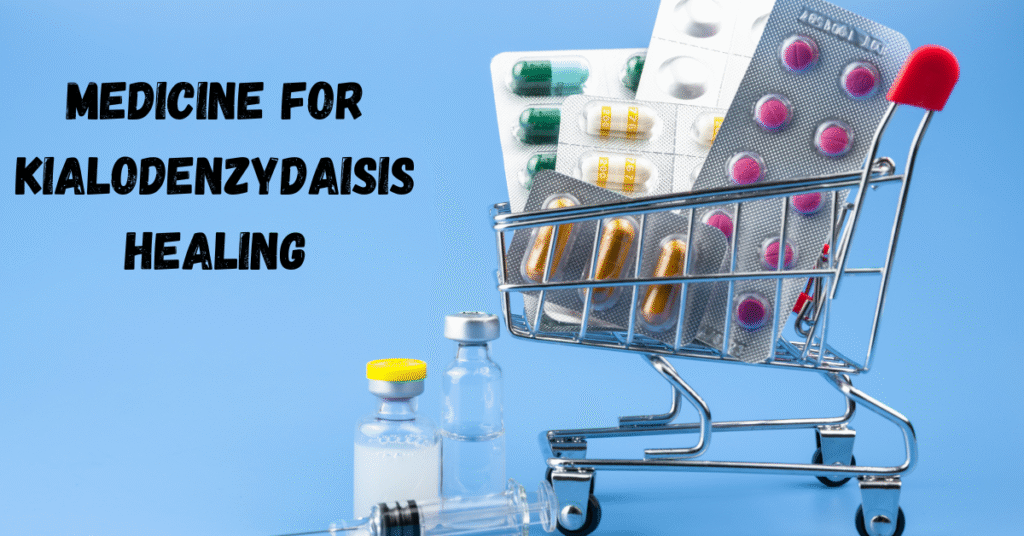Kialodenzydaisis is a rare and often misunderstood condition that requires a careful and personalized approach to treatment. Because of its complex nature, patients and caregivers often struggle to find effective medicine for kialodenzydaisis healing. In this article, we will explore the leading medicinal options, holistic approaches, and ongoing research related to treating this condition.
Patient Profile Biographie Table
| Attribute | Description |
| Condition Name | Kialodenzydaisis |
| Common Symptoms | Fatigue, neural inflammation, chronic pain |
| Treatment Goal | Symptom relief, inflammation reduction |
| Primary Medicines | Anti-inflammatories, nerve stabilizers, botanics |
| Treatment Duration | Typically long-term management |
| Patient Demographic | Adults 30-60 years old |
| Specialist Needed | Rheumatologist, Neurologist |
What Is Kialodenzydaisis?
Kialodenzydaisis is a chronic inflammatory condition that affects the nervous and immune systems. The root cause is still under study, but it’s believed to involve autoimmune reactions and systemic inflammation, which can trigger painful, long-term symptoms.
Importance of Early Diagnosis and Treatment
Early diagnosis of kialodenzydaisis is essential. When caught in its early stages, medicines for kialodenzydaisis healing can slow the disease progression, reduce symptoms, and greatly improve quality of life. Delayed treatment may lead to irreversible damage.
Prescription Medicines for Kialodenzydaisis Healing
Several prescription medicines have shown promise in managing kialodenzydaisis. These include:
Anti-Inflammatory Drugs (NSAIDs)
Nonsteroidal anti-inflammatory drugs like ibuprofen or naproxen are often the first line of treatment to reduce inflammation and pain.
Corticosteroids
Prednisone is used for short-term relief during flare-ups. These drugs suppress the immune response but must be carefully dosed to avoid side effects.
Immunosuppressants
Drugs like methotrexate or azathioprine are used when autoimmunity is suspected. They can reduce immune system activity to prevent further nerve or tissue damage.
Nerve Stabilizers
Gabapentin and pregabalin help reduce nerve pain and are commonly prescribed for patients experiencing tingling, burning, or stabbing sensations.
Herbal and Alternative Medicine for Kialodenzydaisis Healing
While traditional pharmaceuticals form the foundation of treatment, alternative remedies are gaining popularity. Here are some noteworthy options:
Turmeric (Curcumin)
Curcumin, the active compound in turmeric, has powerful anti-inflammatory and antioxidant properties. It may help reduce systemic inflammation when taken regularly.
Omega-3 Fatty Acids
Found in fish oil, omega-3s are known to reduce inflammation and improve neurological function.
Ashwagandha
An adaptogen that helps regulate the immune system and reduce stress — both of which are crucial in managing kialodenzydaisis.
Lifestyle Adjustments to Support Medicine for Kialodenzydaisis Healing
Medicines work better when combined with healthy lifestyle changes. Patients are advised to follow a supportive routine that includes:
Anti-Inflammatory Diet
Foods rich in antioxidants, fiber, and healthy fats (like berries, leafy greens, and olive oil) may help reduce inflammation and improve energy levels.
Regular Gentle Exercise
Yoga, stretching, and low-impact activities improve circulation, reduce stiffness, and support overall well-being.
Sleep Hygiene
Chronic illness often disrupts sleep. A consistent sleep schedule and calming bedtime routine are key for long-term healing.
Monitoring and Adjusting Treatment
Since kialodenzydaisis varies from person to person, treatment plans must be dynamic. Patients should work closely with their healthcare team to:
- Monitor side effects of medicines
- Adjust dosages as needed
- Introduce or remove therapies based on response
Emerging Research and Future Treatments
Medical science is evolving, and research into kialodenzydaisis is ongoing. Promising developments include:
Biologic Therapies
These target specific parts of the immune system and may offer more precise treatment with fewer side effects.
Stem Cell Therapy
Though experimental, stem cell therapy may offer regenerative healing to damaged nerves or tissues affected by the condition.
Natural Supplements: A Complementary Role
While not a replacement for prescription medication, natural supplements can enhance healing when approved by a healthcare provider. Some commonly used supplements include:
- Vitamin D: Supports immune regulation
- Magnesium: Helps with nerve and muscle function
- B-Complex: Supports neurological health
Risks and Considerations
All medicines, natural or synthetic, carry risks. It’s essential to:
- Avoid self-diagnosing or self-medicating
- Consult a physician before starting any new treatment
- Regularly assess treatment effectiveness
Support Networks and Mental Health
Living with kialodenzydaisis can be emotionally taxing. Joining a support group or talking to a mental health professional can ease the mental burden and offer community support.
Conclusion
Finding the right medicine for kialodenzydaisis healing is a process that combines medical expertise, patient input, and ongoing evaluation. A blend of pharmaceuticals, lifestyle improvements, and alternative therapies can create a comprehensive treatment plan tailored to individual needs. With early intervention and dedicated care, it is possible to manage this rare condition effectively and improve one’s quality of life.
Read more: Luxury Villas Ibiza Le Collectionist – Premium Island Living Redefined
FAQs about Medicine for Kialodenzydaisis Healing
A1: The best medicine varies per patient but often includes NSAIDs, corticosteroids, nerve stabilizers like gabapentin, and sometimes immunosuppressants.
A2: Currently, there is no known cure. However, symptoms can be managed with a combination of medicine, lifestyle changes, and alternative treatments.
A3: Yes, turmeric, omega-3 supplements, ashwagandha, and magnesium have shown helpful results in reducing symptoms.
A4: The cause is not fully understood, but genetics may play a role. Environmental and autoimmune factors are also believed to contribute.
A5: Treatment is usually long-term and ongoing. The aim is to manage symptoms and prevent progression rather than cure.

